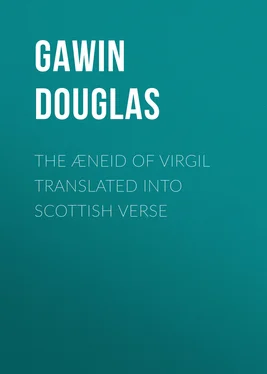Gawin Douglas - The Æneid of Virgil Translated Into Scottish Verse
Здесь есть возможность читать онлайн «Gawin Douglas - The Æneid of Virgil Translated Into Scottish Verse» — ознакомительный отрывок электронной книги совершенно бесплатно, а после прочтения отрывка купить полную версию. В некоторых случаях можно слушать аудио, скачать через торрент в формате fb2 и присутствует краткое содержание. Жанр: foreign_poetry, Поэзия, foreign_antique, foreign_prose, на английском языке. Описание произведения, (предисловие) а так же отзывы посетителей доступны на портале библиотеки ЛибКат.
- Название:The Æneid of Virgil Translated Into Scottish Verse
- Автор:
- Жанр:
- Год:неизвестен
- ISBN:нет данных
- Рейтинг книги:4 / 5. Голосов: 1
-
Избранное:Добавить в избранное
- Отзывы:
-
Ваша оценка:
- 80
- 1
- 2
- 3
- 4
- 5
The Æneid of Virgil Translated Into Scottish Verse: краткое содержание, описание и аннотация
Предлагаем к чтению аннотацию, описание, краткое содержание или предисловие (зависит от того, что написал сам автор книги «The Æneid of Virgil Translated Into Scottish Verse»). Если вы не нашли необходимую информацию о книге — напишите в комментариях, мы постараемся отыскать её.
The Æneid of Virgil Translated Into Scottish Verse — читать онлайн ознакомительный отрывок
Ниже представлен текст книги, разбитый по страницам. Система сохранения места последней прочитанной страницы, позволяет с удобством читать онлайн бесплатно книгу «The Æneid of Virgil Translated Into Scottish Verse», без необходимости каждый раз заново искать на чём Вы остановились. Поставьте закладку, и сможете в любой момент перейти на страницу, на которой закончили чтение.
Интервал:
Закладка:
CAP. IX
Into this nixt cheptour ȝe may attend
Of Priam Kyng of Troy the fatale end.
Peraventur, of Priamus wald ȝe speir
Quhou tyd the chance, hys fait gif ȝe lyst heir
Quhen he the cite saw takyn and downbet,
And of his palyce brokyn euery ȝet,
Amyd the secret closettis eik hys fays,
The auld grayth, al for nocht, to hym tays
Hys hawbryk quhilk was lang furth of vsage,
Set on his schulderis trymlyng than for age;
A sword, but help, about hym beltis he,
And ran towart hys fays, reddy to de.
Amyd the clos, vnder the hevyn al bayr,
Stude thar that tyme a mekil fair altare,
Neyr quham thar grew a rycht ald lawrer tre,
Bowand towart the altare a litill wie,
That with his schaddow the goddis did ourheld.
Hecuba thydder, with hir childer, for beild
Ran al invane, and about the altare swarmys,
Brasand the godlyke ymage in thar armys,
As for the storm dowis flokkis togidder ilkane:
Bot quhen scho saw how Priamus has tane
His armour, so as thocht he hald beyn ȝyng;
Quhat fulych thocht, my wrachit spows and kyng,
Movis the now syk wapynnys forto weld?
Quhidder hastis thou? quod sche; of na sik beld
Haue we now mystir, nor syk deffendouris as the,
The tyme is nocht ganand tharto we se.
In cace Hector war present heir, my son,
He mycht nocht succour Troy, for it is won:
Quharfor, I pray the, syt doune and cum hydder,
And lat this altare salue ws al togidder,
Or than atanys al heir lat ws de.
Thus said scho, and, with sik sembland as mycht be,
Hym towart hir has brocht, but ony threte,
And set the auld doune on the haly sete.
Bot lo! Polytes, ane of Priamus sonnys,
Quhilk from the slauchter of Pyrrus away run is,
Throw wapynnys fleyng and his ennemys all,
By lang throwgangis and mony voyd hall;
Woundit he was, and come to seik reskew;
Ardently Pyrrus gan him fast persew,
With grondyn lance at hand so neir furthstrekit,
Almaist the hed hym twichit and arekit.
Quhil at the last, quhen he is cummyn, I weyn,
Befor his faderis and his moderis eyn,
Smate hym down ded in thar sycht, quhar he stude,
The gaist he ȝald with habundans of blude.
Priamus than, thocht he was halfdeill ded,
Mycht nocht conteyn his ire nor wordis of fed,
Bot cryis furth: For that cruell offens,
And owtragyus fuyl hardy violens,
Gif thar be piete in the hevin abone
Quhilk takis heid to this at thou has done,
The goddis mot condyngly the forȝeld,
Eftir thi desert rendring sik gaynȝeld,
Causit me behald myne awyn child slane, allace!
And with hys blude fylit the faderis face.
Bot he, quhamby thou fenys thi self byget,
Achil, was not to Priam sa hard set;
For he, of rycht and faith eschamyt eik,
Quhen that I come hym lawly to beseik,
The ded body of Hector rendrit me,
And me convoyit hame to my cite.
Thus sayand, the ald waykly, but fors or dynt,
A dart dyd cast, quhilk, with a pyk, gan stynt
On his harnes, and in the scheild dyd hyng,
But ony harm or other dammagyng.
Quod Pyrrus, sen always thou saist swa,
To Pellyus son, my fader, thou most ga:
Beir hym this message, ramembir weil thou tell
Him al my warkis and dedis sa cruell;
Schaw Neoptolemus is degenerit cleyn.
Now salt thou de: and with that word, in teyn,
The ald trymlyng toward the altare he drew,
That in the hait blude of his son, sched new,
Fundrit; and Pyrrus grippis hym by the hayr
With his left hand, and with the tother al bayr
Drew furth his schynand swerd, quhilk in his syde
Festynnyt, and onto the hyltis dyd he hyde.
Of Priamus thus was the finale fait;
Fortone heir endit his gloryus estait,
Seand Ilion al byrn in fyris brown,
And Troys wallis fall and tumlyt down;
That ryal Prince, vmquhile, our Asya,
Apon sa feil pepil and realmys alswa
Ryngnyt in welth, now by the cost lyis ded,
Bot as a stok, and of hakkit his hed;
A corps, but lyfe, renown, or other fame,
Onknawyn of ony wight quhat was his name.
CAP. X
Quhou Venus gan to Eneas appeir,
And of his fader and other materis seyr.
Fyrst than the grysly dreid about me start;
Astonyst I wolx, for sone prent in myne hart
The ymage of my deir fader, quhen I
The kyng his evyneild beheld sa cruelly
By deidly wound ȝaldand vp the spreit.
On dessolat Crevse, my spows sa sweit,
I thocht alsso, and dangeris of my place;
Of litill Ascaneus sayr I dred the cace.
About I blent to behald, heir and thar,
Quha of our feris remanyt with me thar.
Al war thai fled full wery, left me alane;
Sum to the erd loppin from hie towris of stane;
Sum in the fyre thar irkit bodeis leit fall;
Thar was na ma bot I left of thame all:
Quhen in the tempil of Vesta the goddas,
Lurkand ful law, intil a secrete place,
Tyndarus douchter, queyn Helene I espy;
The fyrys schane sa brycht, as I went by,
All thing was patent quhar so euer I went.
Scho, dreding les the Troianys wald hir schent,
And kast sum way for hir distructioun,
Becaus all Troy, for hir, was thus bet doun,
Sayr punytioun of Grekis dred scho, als
Hir husbandis wroth, quham scho left and was fals,
And eik the common fatale fury of Troy,
Hir self scho hyd tharfor, and held ful koy,
Besyde the altare sytting onethis seyn.
My spreit for ire brynt in propir teyn,
And, al in greif, thocht cruel vengeans take,
Of my cuntre for this myschews wrake,
With byttir panys to wreke our harmys smart;
Thocht I, sal scho pas to the realm of Spart
Hailskarth, and se Mycene hir natyve land,
And with triumphe follow hir fyrst husband?
Or, lyke a queyn, sal scho wend hame our see?
Hir frendis agane and childring sal scho se,
Accumpanyit with mony Troiane maid,
And Phrygiane seruandis in bondage with hir had?
Sen now, by hir, with sword lyis Priam ded,
And ryal Troy all brynt in flambis red;
Of Dardane eik the strandis and the flude
Sa oft has bene waterit or bathit in blude.
Na, na, nocht swa, I wys, that sal scho nocht:
And, set it be nocht lovabill nor semly thocht
To punys a woman, bot schameful hir to sla,
Na victory, bot lak followyng alswa;
Ȝit, netheles, I aucht lovit to be
Vengeans to tak on hir deservis to de.
It wil my mynd asswage, forto be wrokyn
On hir quham by Troy brynt is and down brokyn,
And, forto eik the myscheif of hir ded
Til our sorowis, fyllit with assis red.
Syk thingis I thocht half wod and furyus,
As owt of wit my mynd was cachit thus;
Quhen that my blissit moder, of sik bewte,
Apperit farer than euer I dyd hir se,
Schynyng ful cleir for al the dyrk nycht,
Confessyng hir tobe a goddes brycht;
In sik form of quantite and estait
As scho is seyn with spretis deificat.
Me by the rycht hand hynt scho, and held fast,
And with hir rosy lippis thus said at last;
Son, quha sa gret and furyus cruelte
And hie ondantit ire has rasyt in the?
Quhy gois thou mad? quhidder is went thus onkynd
Our ramembrance, or we forȝet of mynd?
Suld thou not first think quhar thou left, but les,
Thi wery fader, the agit Anchises?
Wenys thou, or not, Crevsa ȝit levand be,
And Ascanyus thi ȝong son? quham al thre
The Grekis armyis walkis rownd about;
And, bot my myght rasistit thame, sans dout
Thai had bene brynt or this in flambis red,
And with thar fays swordis smyt to ded.
Not the bewte of Helene Laconya,
Quham thou hatis, nor Parys, quhilk alswa
Is blamyt oft, this ryches has ȝou reft;
Bot the wroth of the goddis has down beft
The city of Troy from top onto the grond.
Behald! (for I, within a litil stound,
The clowd of dyrknes from thi sycht so cleir,
That on ȝour mortell eyn, quhil ȝe beyn heir,
Lyke to ane watry slowch standis dym about;
Thi moderis heist on na wys nedis the dowt,
Na hir command refusyng to obey)
Quhar thir towris thou seys downfall and swey,
And stane fra stane down bet, and reyk vp rys,
With stew, powder, and duste myxt on this wys,
Neptune the fundamentis of thir wallis hie,
With his gret mattok havand granys thre,
Vndermyndis rownd about the towne,
Furth of the grond holkand the barmkyn doun.
Maist cruel Juno has, or this, alsswa
Saysit with the fyrst the port clepit Sceya,
And from the schippis the ostis in scho callis,
Standing wod wraith enarmyt on the wallis.
The hie castellis and strenthis to and fra,
Behald, now Pallas of Tritonya
All occupyis, schynyng in weirlyke weid,
Fell Gorgones hed into hir scheild, tak heid.
The gret fader Jupiter strenth and mycht
Distributis happely to the Grekis in fyght,
And eik the goddis ire prouokis he
Aganys Troianys power in the melle.
Fle thou, my son, in haist away thou wend,
And of this laubour onprofitabil mak ane end;
I salbe with the soverly and ful koy,
Quhil to thi faderis ȝet I the convoy.
Thus sayand, scho hir hyd in the cloys nycht.
Than terribil figuris apperis to my sycht
Of gret goddis, semand with Troy agrevit;
And tho beheld I al the cite myschevit,
Fayr Ilion all fall in gledis down,
And, fra the soyll, gret Troy, Neptunus town,
Ourtumlyt to the grond: so as ȝhe se
The lauboreris, into the montanys hie,
With steil axis byssely hak and hew
A mekil ayk that mony ȝeir thar grew;
The tre branglis bostyng to the fall,
With top trymlyng, and branchis schakand all;
Quhil finaly it get the lattyr straik,
Than, with a rair, down duschis the mekil aik,
And with his fard brekis down bewis about.
Furth of that sted I went, and throu the rowt
Of ennemyis and flambis I me sped;
The fyre and wapynnys gave me place, and fled.
So happely the goddes gydit me,
Quhil that within the portis and entre
Of my faderis lugyng am I cummyn;
My fader, than, quham I schupe to haue nummyn,
And caryit to the nerrest hillys hycht,
And hym tharto solist with al my mycht;
Bot he reffusys or euer to leif in joy
Eftir the rwyne and distructioun of Troy:
To suffir exile he said that he ne couth.
O ȝe! quod he, in blude and florist ȝouth,
That has ȝour strenth ȝit, and ȝour forcy mycht,
Pas on ȝour way onone, and tak the flycht.
Gif goddis lykyt lenth my life langar space,
Thai wald haue salwyt to me this litil place.
It is eneuch, eneuch, and mair, I weyn,
A distructioun of Troy that we haue seyn,
Remanyng alyve eftyr the cite tane.
So, so, hald on, leif this ded body alane;
Say the last quething word, adew, to me.
I sal my deth purches thus, quod he:
Quhen our ennemys seys me enarmyt stand,
Sum sal haue reuth, and sla me with his brand,
To get my spulȝe; quhat of the body na cure;
The corps is sone warpit in sepulture.
Hatit of the goddis, to all nedis onhabill,
Thir mony ȝeris I left inprofitabill,
Ay sen the fader of goddis and kyng of men
With thunderis blast me smate, as that ȝe ken,
And with his fyry levin me omberauch,
That we intill our langage clepe fyreflauch.
Rehersyng this, fermly he dyd remane
At his first purpos fixt, and we agane
Furthȝetting teris, and our spows Crevsa,
Ascanyus ȝyng, and al our menȝe alswa
Besowth my fader to salue his wery banys,
And not be wilful to perys all atanys,
And to escheif the chance as it was went:
Plat he reffusys, anherdyng to his entent,
The fyrst sentence haldyng euer ane.
To start to harnes I am compeld agane,
And, as maste wrachit and miserabil catyve,
Ded I desyrit, and irkyt of my lyve;
For by na wysdome, nor chance, persave I mycht
We couth eschape, nor ȝit by fors in fyght.
O deir fader, quhat wenys thou for ded,
A fut, quod I, me to steir of this sted,
And leif the heir? O God! quha euer couth
Sik cryme to me be said of faderis mouth!
Bot gif it lykis to the goddis hie
Na thing be left of sa fayr a cite,
Or gyf thou hest in mynd decretit eik,
And weil lykis thi self and thine to eik
Onto the rewyne of Troy, and tobe schent,
Ded at our dur is reddy and patent.
From mekil blude schedding of Priamus
Hiddir, belyfe, sal cum cruell Pyrrus,
Quhilk brytnys the son befor the faderis face,
And gorris the fader at the altare but grace.
Is this the way, my haly moder, at thou
Suld kepe me, fays and fyris passand throu,
That I behald, within my chawmyr secrete,
Myne ennemys, and se Ascanyus swete,
My deir fader, and Crevsa my wyfe,
Athir in otheris hait blude leys thar lyfe?
Harnes, seruandis, harnes bryng hydder sone:
The lattyr end, thus venquyst and ondone,
Callys ws agane to batale and assay;
Adone, cum on, this is our lattir day.
Rendir me to the Grekis, or suffir me
The bargane agane begun at I may se;
This day onwrokyn we sal neuer all be slane.
Abowt me than my swerd I belt agane,
And schot my left arme in my scheild al meit,
Bownyng me furth; quhen lo! abowt my feit
My spows lappit fell down into the ȝet,
And litill Iulus forgane his fader vpset:
Gyf thou lyst pas, quod scho, thi self to spill,
Harl ws with the in all perrell quhar thou will;
Bot gif thou trastis, as expert in thi dedis,
Ony help by fors of armys, than the nedis
First to defend and kepe this hows, quod scho,
Quharin thi ȝong son and thi fader beyn, lo!
And I vmquhile that salbe clepit thi spows;
Quham to sall we be left in this waist hows?
Интервал:
Закладка:
Похожие книги на «The Æneid of Virgil Translated Into Scottish Verse»
Представляем Вашему вниманию похожие книги на «The Æneid of Virgil Translated Into Scottish Verse» списком для выбора. Мы отобрали схожую по названию и смыслу литературу в надежде предоставить читателям больше вариантов отыскать новые, интересные, ещё непрочитанные произведения.
Обсуждение, отзывы о книге «The Æneid of Virgil Translated Into Scottish Verse» и просто собственные мнения читателей. Оставьте ваши комментарии, напишите, что Вы думаете о произведении, его смысле или главных героях. Укажите что конкретно понравилось, а что нет, и почему Вы так считаете.












